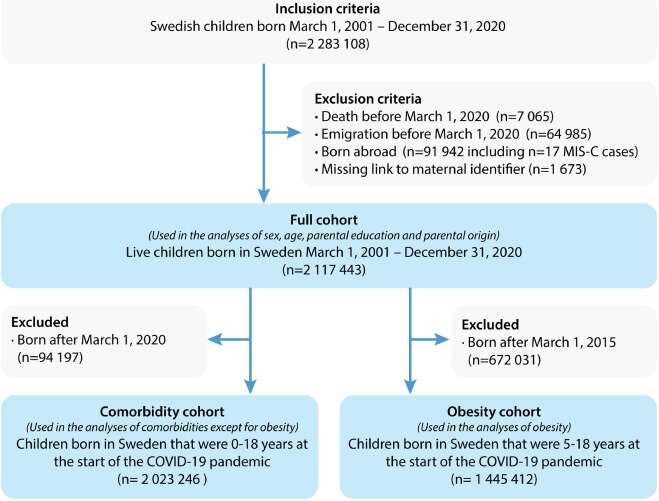
Severe acute COVID-19 is very rare in children, but SARS-CoV-2 infection can trigger a novel post infectious condition called Multisystem Inflammatory Syndrome in Children (MIS-C). MIS-C is a potentially serious condition, and so far, little has been known on risk factors for developing MIS-C.
With that in mind, a large Swedish population-based cohort study was conducted by researchers at Karolinska Institutet, including more than two million Swedish children and adolescents <19 years. Sex, age, parental region of birth, parental education, asthma, autoimmune disease, chronic heart disease, chronic lung disease, obesity and life-limiting conditions were assessed as risk factors. Data were retrieved from national health and sociodemographic registers and information on the outcome MIS-C was retrieved from the Swedish Pediatric Rheumatology Quality Register for the period March 1, 2020–December 8, 2021. Hazard ratios (HRs) and 95% confidence intervals (CIs) were calculated using Cox regression analysis. Incidence rates per 100,000 person-years were calculated assuming a Poisson distribution.
The study, which was recently published in The Lancet Regional Health—Europe, shows that among the 2,117,443 children, 253 children developed MIS-C, corresponding to an incidence rate of 6.8 (95% CI: 6.0–7.6) per 100,000 person-years. Male sex (HR 1.65, 95% CI: 1.28–2.14), age 5–11 years (adjusted HR 1.44, 95% CI: 1.06–1.95 using children 0–4 years as reference), foreign-born parents (HR 2.53, 95% CI: 1.93–3.34), asthma (aHR 1.49, 95% CI: 1.00–2.20), obesity (aHR 2.15, 95% CI: 1.09–4.25) and life-limiting conditions (aHR 3.10, 95% CI: 1.80–5.33) were identified as risk factors for MIS-C. In contrast, adolescents 16–18 years of age, had a decreased risk for MIS-C (aHR 0.45, 95% CI: 0.24–0.85).
“Knowing these risk groups will help us identify patients with MIS-C at the pediatric emergency unit and hopefully also provide knowledge on which children that should be prioritized for continued COVID-19 vaccination if we at some point will go back to only recommending COVID-19 vaccination to risk populations,” says Samuel Rhedin, pediatric resident at Sachs’ Children and Youth Hospital and postdoc at the Department of Medical Epidemiology and Biostatistics, Karolinska Institutet, one of the researchers behind the study. “But it is also important to remember that the risks for MIS-C were very low in this study, also in the identified risk groups.”
Karolinska Institutet

